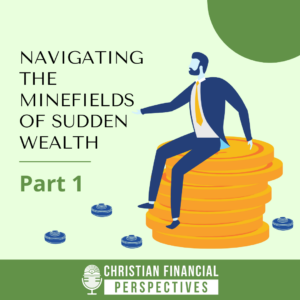Click below to listen to Episode 165 – Navigating The Minefields Of Sudden Wealth Part 1
Subscribe: Apple Podcasts | Google Podcasts | Spotify | Amazon Music | Stitcher | RSS | More
Navigating The Minefields Of Sudden Wealth Part 1

Learn the most common ways sudden wealth is obtained, along with shared mistakes people make when they fall into sudden wealth.

In part 1 of our 2 part series on Sudden Wealth, Bob and Shawn discuss the complex issues around sudden wealth, common sources, and frequent pitfalls. Exploring this from a Biblical perspective, they emphasize stewardship and wise decision-making. Some common sudden wealth sources, including inheritances, property value increase, oil and gas discovery, and divorce settlements are discussed.
They outline common mistakes such as failure to pre-plan for taxes, misunderstanding how quickly money can be spent, and impulsively buying depreciable assets. They strongly advocate for careful planning, caution, and seeking advice to successfully navigate this tricky financial terrain.
HOSTED BY: Bob Barber, CWS®, CKA®
CO-HOST: Shawn Peters
Mentioned In This Episode
Bible Verses In This Episode
LUKE 16:10
Whoever can be trusted with very little can also be trusted with much, and whoever is dishonest with very little will also be dishonest with much. So if you have not been trustworthy in handling worldly wealth, who will trust you with true riches? And if you have not been trustworthy with someone else’s property, who will give you property of your own?
PROVERBS 21:20
The wise man saves for the future, but the foolish man spends whatever he gets.
Want to ask a question about your specific situation? Schedule a complimentary 15 minute phone call.
EPISODE TRANSCRIPT
Intro:
Welcome to the Christian Financial Perspectives Podcast, where you will learn what the Bible says about stewardship and finance. Here you will gain insight, wisdom, and knowledge of how to integrate your Christian faith with your finances. Here’s your Christian Financial advisors host, Bob Barber and his co-host, Shawn Peters.
Shawn:
Welcome everyone, to another episode of Christian Financial Perspectives. We’re so glad that you’ve joined us today. I’m Shawn Peters, and with me as always, is my esteemed father-in-law, Bob Barber . Today we’re gonna be covering a part one of a two-part series on “Navigating The Minefields Of Sudden Wealth”. So today, part one is gonna be common sources and mistakes of sudden wealth, and then in part two, we’re gonna be covering the dangers of and what to do with sudden wealth. So today we’ve got a couple scriptures for you, but I’m gonna go over to you, Bob. What do you got for us today?
Bob:
Well, it is about sudden wealth. I’ve dealt with this a lot in the many years I’ve been doing this in the business, which is over 30. Man, I’m starting, I’m getting old there, Shawn, but I’m just getting good now. So, I got another 20 years to go, I hope. But all these are very simple ways. I’ve seen them over and over, and so we’re gonna go over some really wise things that people need to be thinking about. If you know anybody that’s gonna be coming into sudden wealth from one of these ways, you definitely need to get ’em to to listen to this episode.
Shawn:
Thanks, Bob. So first we’re gonna cover, first scripture, Luke 16:10, “Whoever can be trusted with very little can also be trusted with much. And whoever is dishonest with very little will also be dishonest with much. So, if you have not been trustworthy in handling worldly wealth, who will trust you with true riches? And if you have not been trustworthy with someone else’s property, who will give you property of your own.”
Bob:
One of my favorites, Shawn, because, it’s like, okay, if you do well with this thousand dollars I can give you, how you gonna, maybe I can give you $3000, and if you do well with 3k, then maybe I can give you 30k. So God’s really saying here to us, if you’ve been good with a little bit, you can have more.
Shawn:
Exactly. And then our second scripture is Proverbs 21:20, “The wise man saves for the future, but the foolish man spends whatever he gets.”
Bob:
So, Shawn, I looked up what sudden wealth syndrome, the definition of it is according to Investopedia, and this is what it says, “Sudden wealth syndrome is a type of distress that affects individuals who suddenly come into a large sum or sums of money. Becoming suddenly wealthy can cause people to make decisions they not otherwise make.” No kidding.
Shawn:
That is true. Yes. Okay. So what are 8 common ways sudden wealth can occur? The first one, which is probably the most common for those of you out there, is a large inheritance. And second one, property you own suddenly becomes very valuable. You know, maybe…
Bob:
Happens a lot here in Texas.
Shawn:
Exactly. Maybe all of a sudden that the city creek got a little bit closer to your farmland out there or your little pot of ranch land and Oh, now a developer wants to buy the whole thing. So number three, Bob.
Bob:
Oh, number three, we’ve dealt a lot with this here in Texas, Shawn, as you know. And gosh, about 10 years ago when we had the Eagle Ford Shell strike, it was really big. And that’s an oil and gas discovery.
Shawn:
Texas tea.
Bob:
Black Gold. Beverly Hillbillies. I know what you’re talking about. Okay. But the same thing happened in other areas and the northeast, there’s a lot of oil and gas up in the Northeast. Like in Pennsylvania, Pennzoil that’s one of the original companies. You’ve got in the Midwest, upper Midwest, there was a lot of oil struck, so this is a very common way as well. I mean, it’s not common for everyone. Not near as common as an inheritance, but it is still very common in our country.
Shawn:
That’s right. And another one, large divorce settlement, so kinda like large inheritance and neither of those cases, is it a very happy occurrence, but it is something that that happens.
Bob:
And we need to talk about this because we’re going to go into a little bit about how that can – you gotta be really careful because the money can go quickly, especially somebody that is divorced and is used to a very, very high income, maybe high income earner, and the one they divorce is no longer making the income.
Shawn:
Right.
Bob:
Exactly. Or they are making the income, but you’re not part of that now.
Shawn:
And I know you’ve seen that numerous times over the years.
Bob:
I have. Sure have.
Shawn:
If you know someone is divorced and let’s say we’re working with the wife, and now the ex-wife, but you know, she was not the primary income earner and her now ex-husband was the primary income earner. And all of a sudden, sure, it might have been a large settlement, but you have to be very careful that you don’t try to spend on the same level that you were maybe used to. Because otherwise that money’s not gonna last.
Bob:
So we’re gonna go over those common mistakes and talk about some of this. Number five is a large life insurance payout. And again, this is an unfortunate one. But I have seen this in my years as well.
Shawn:
That’s right. And number six, IPO of a stock you have goes big. So that’s again, we’re kind of going, I guess more or less most common to less common.
Bob:
Yeah. But it’s funny, these last two we end up on might be more common than you think. Okay.
Shawn:
A little higher on the list.
Bob:
Number seven is a large company bonus, and number eight is a large pension cash out. We see that a lot with our retirees that come from companies they’ve been with a very long time. Okay. So we’re gonna go over the common mistakes that we see when you inherit this sudden wealth like this that you just you’re not thinking about. Okay. So the first one is…
Shawn:
Not pre-planning for taxes before it happens, or in some cases soon after.
Bob:
Yeah. It’s so important if you know this is coming to get with somebody and talk with them about it. If it’s after the fact, then there’s still some things we can do. But we need to do ’em quickly, especially before the end of the year.
Shawn:
I think for the most common ones is that the inheritance or the maybe if you have that IPO or pension cash out, some of those ones.
Bob:
Pension cash outs can be very, very dangerous. You gotta do it correctly.
Shawn:
That’s right. So if you don’t have your estate planning in place, that would definitely be part of that pre-planning. Or if it’s your parents are maybe a little bit older and they don’t have their estate plan. Well that would definitely be something to look into because why do you wanna give the government more taxes than you have to ?
Bob:
So, boy, Shawn, this is a very common one. This second mistake that people make with sudden wealth is they really just, they just don’t understand how quickly it can disappear in just a matter of years.
Shawn:
That is true.
Bob:
And man, I see the parents, it took ’em 30, 35 years to save up to this million dollar portfolio or $2 million portfolio, and then it could be spent in three to five years easily. I always tell somebody with sudden wealth, how long is it gonna take you to get back to that point? And it’s gonna take just as long as the parents did. So you really have to have a good understanding with sudden wealth, how quickly it can disappear. And this third one is a big one too. I’ll let you cover that.
Shawn:
So the third one is suddenly buying a lot of depreciable assets. So there’s the sudden wealth, whatever the source was, but that common mistake is, oh, I have all this extra, all these extra assets. I have all this extra money, so I’m gonna go buy an extra car that they don’t really need and I’m gonna buy an extra boat, buy an RV, tractor or you know what, I’m wealthy now, I’m gonna go and buy a small airplane at $500,000 on the low end .
Bob:
And you know why I put these in here? Because I’ve seen ’em all. It’s happened. I’ve seen every single one of these I’ve seen. Seriously. And I just, it’s so important.
Shawn:
Well, I think back to when the Eagle Ford Shale was really hopping and you had worked with a number of people from like the same family. And during that time, Bob had one client was being very careful, being very frugal, not trying to go from, Hey, they were making $40,000, $50,000 a year. Now, they’re making $50,000 or more a month. And they tried to more or less kind of stick to a similar lifestyle, a very similar income. And eventually, when the income started to slow way down, which inevitably happens with that, they were doing okay, but then you had some of the other family members that all were basically in the same situation, but they just started spending like crazy, buying all this stuff. And then eventually, their income kind of dwindled away, and they didn’t really have anything to show for it.
Bob:
Which one of the things I saw a lot from out of the big oil boom here in Texas, we have the Hill Country and between here and the coast and some really good fishing down on the coast and some beautiful places. But some of the best fishing is the Gulf Coast. So they were like, I’m gonna go buy me a vacation home on the coast, Shawn. And they were never thinking about the taxes, the insurance, the maintenance, especially the maintenance on that salt water. And this ate their lunch financially and they had to, you saw a bunch of them being sold off a couple years later because as you know, oil and gas money, as an example, it hits big in the beginning and then it goes way down and then it levels off. But it may be a million dollars in the first year. The second year may be 500k and the third year is 200k. And it gets down to 100k and it’s clicking along there. So you cannot build a lifestyle based on, when you hit something big like that, based on that amount.
Shawn:
Those initial years of income, because it’s not gonna last at that level. So basically that was number four, suddenly buying a vacation home and not understanding the cost associated with that because you know, that million dollar home, for example, it costs a lot of money. Especially like you said, if it’s on the coast and if you don’t maintain it, then, I mean you can’t keep it.
Bob:
Big one, a big one here, Shawn, with sudden wealth that I see, too, is telling family members about it and friends, you should not do that. It should be kept very confidential, except for maybe a few, I mean, your spouse. Okay, I understand that.
Shawn:
You gotta tell your spouse.
Bob:
But you should not – but in the life insurance example, and this is a sad thing, I’ve seen where the spouse is remaining, other people know, and they find out and they’re kind of lining up, Hey, I need a business loan all of a sudden, or I need some money, could you give me some? And I guarantee you, Shawn, anybody that’s hearing this that’s come across sudden wealth will tell you, “Bob’s right on it.” Because I’ve had these conversations with people.
Shawn:
All of a sudden, Bob, there’s some cousin you didn’t know about or some friend of a cousin or friend of a sibling.
Bob:
Always giving these opportunities. Yep. Number six, of course it’s obvious with this one, but it’s taking withdrawals too frequently from your new found wealth thinking it’s just gonna last and last and last. And you know, you watch them take 20% or 30% withdrawals every year. Well, four or five years. And we’ve given warnings in this. We’ve given warnings over and over. You’re going through your wealth, you’re gonna spend it all if you’re not careful, what would take 30, 40 years to get to. This is a big warning. Be careful about this withdrawals and get with a fiduciary, not a commission based advisor. A fiduciary based advisor where you’re paying them, they’re not making money from commissions by what they sell you, because they’re out there. And you gotta be very careful of that.
Shawn:
And then of course, the last common mistake, raising your cost of living and lifestyle without understanding how it affects everything financially.
Bob:
Yes.
Shawn:
So you know, just it kind of goes back to taking too much withdrawals. I mean it’s just, it’s all about understanding the true cost of whether it’s assets or living a certain way and whether or not that’s sustainable. So, that about wraps it up for today.
Bob:
Part one. That’s a lot to take in, by the way.
Shawn:
It is, it is.
Bob:
It’s a whole lot.
Shawn:
So in part two, like we mentioned a little earlier, but part two, we’re gonna be covering, “Navigating The Minefields of Sudden Wealth”.
Bob:
Yeah. We’re gonna be talking about the dangers of sudden wealth to yourself and from others and what you should do with all that sudden wealth.
Shawn:
Oh, that’s right. I said the title of the series. So “Dangers of Sudden Wealth to Yourself and Others” and “What You Should Do With Sudden Wealth”. That’s what we’ll be covering next week.
Bob:
Next week. That’s right.
Shawn:
Alright. As always, we’re here to help. If you have questions, suggestions for podcast episodes, just wanna get in contact with us. You can visit our website www.christianfinancialadvisors.com or you can call or text us during business hours Monday through Friday, 8 to 5, at (830) 609-6986. Thank you and God bless.
——-
[CONCLUSION]
That’s all for now.
We invite you to listen to all of our past episodes covering many financial topics from a Christian Perspective. To make sure you don’t miss any of Bob’s upcoming episodes you can subscribe to Christian Financial Perspectives on iTunes, Google Play Music, Spotify, or Stitcher. To learn more about integrating your faith with your finances, visit ciswealth.com or call 830-609-6986.
[DISCLOSURES]
Investment advisory services offered through Christian Investment Advisors Inc dba Christian Financial Advisors, a registered investment advisor registered with the SEC. Registration as an investment advisor does not imply a certain level of skill or training. Comments from today’s show are for informational purposes only and not to be considered investment advice or recommendations to buy or sell any company that may have been mentioned or discussed. The opinions expressed are solely those of the hosts, Bob Barber and Shawn Peters, and their guests. Bob and Shawn do not provide tax advice and encourage you to seek guidance from a tax professional. While Christian Financial Advisors believes the information to be accurate and reliable, we do not claim or have responsibility for its completeness, accuracy, or reliability.









